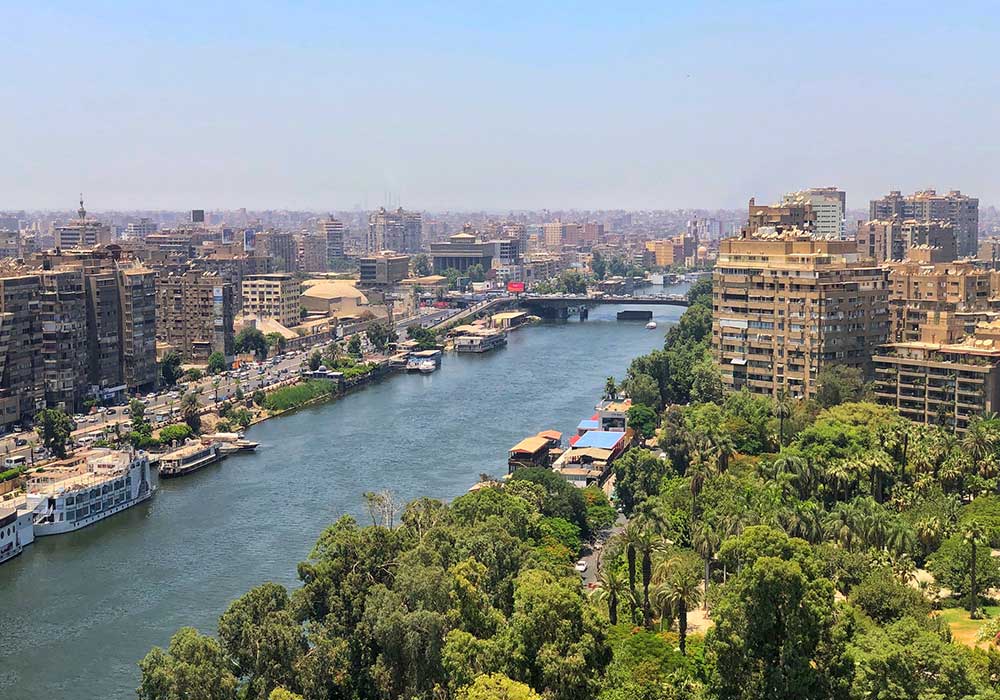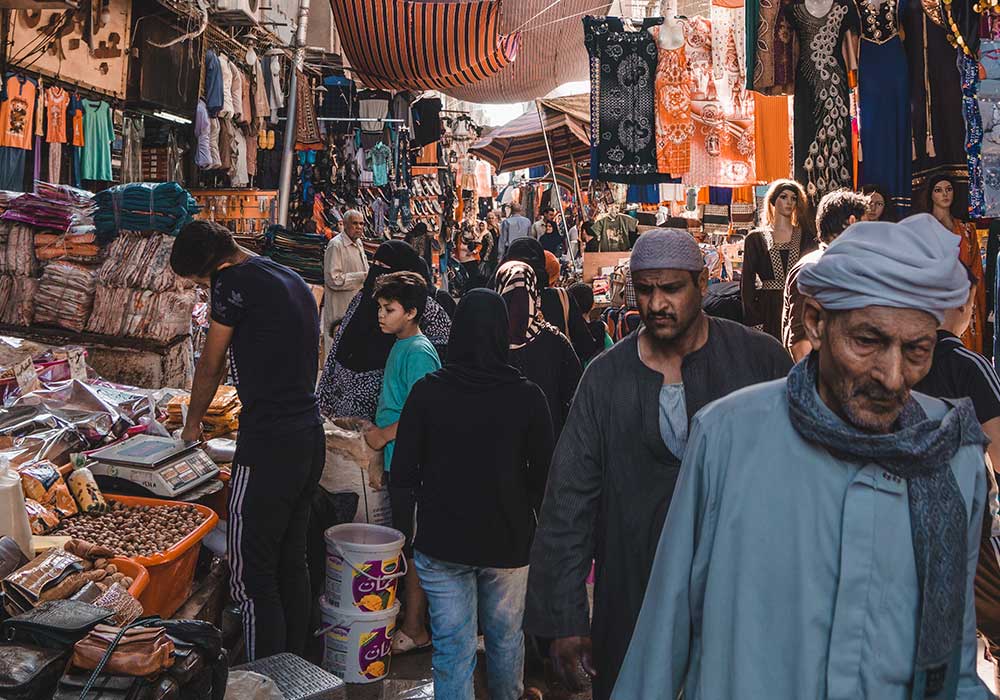
NABC and Egypt
The NABC is highly active in the organisation of several activities involving Egypt, including incoming/outgoing trade missions from/to Egypt and round table discussions.
Most recently, the NABC organised a 20-company Netherlands Pavilion at the Sahara Expo in September 2024, as part of a broader mission that included additional field visits, seminars, and networking events. Prior to this, the NABC hosted a “Doing Business in Egypt Week” in the week of May 13th, 2023.
During this week, NABC welcomed an incoming delegation from the Egyptian Junior Business Association and hosted a corresponding matchmaking event on Monday. On Tuesday, the NABC joined a round table the World Hydrogen Summit, specifically focusing on Dutch-Egyptian collaboration opportunities in the field of green hydrogen. On Wednesday, NABC was actively involved in the Egyptian-Dutch Business Seminar which was hosted by the Embassy of the Arab Republic of Egypt to the Netherlands – NABC’s Egypt Country Experts moderated the event and gave a presentation on NABC’s activities in Egypt. Lastly, on Thursday, NABC and the Standard Chartered Bank organised the second Egypt-focused Africa Expert Round Table to discuss macroeconomic developments following Egypt’s liquidity turnaround in Q1 of 2024.
The latter event was a virtual follow-up to NABC’s first Egypt-Focused Africa Expert Breakfast round table which took place in January 2023. The first round table was organised in collaboration with the Standard Chartered Bank, VNO-NCW, and Invest International, and it focused on Egypt’s stabilisation efforts and what results can be expected in 2023. Since then, the Standard Chartered Bank has obtained a new license to open a branch operating in Egypt in November 2023 to contribute to the Egyptian Economy.
Shortly before NABC’s “Egypt Week”, NABC welcomed an Egyptian delegation in April 2024 to the Africa Works! 2024 conference. Furthermore, in February 2024, the NABC led a Study Tour on Protected Horticulture and Cold Chain Supply to Cairo, Egypt. This Study Tour was part of a larger consortium focused on Climate and Water Smart Protected Cultivation in Egypt, further including Dutch Greenhouse Delta and Delphy. This consortium is currently active in establishing a Partners in Business programme within this field.
In March 2023, the NABC organised an outgoing Waste Processing & Circular Economy Mission to Egypt. Furthermore, the NABC was involved in the establishment of a Netherlands Pavilion at the Wadi Expo in Luxor in May 2023 (including follow-up field visits), and at the Sahara Expo in Cairo in September 2022.
The NABC further welcomed an Egyptian delegation consisting of the Horticultural Export Improvement Association’s (HEIA) members during Africa Works! 2022. The delegation attended the conference with workshops focusing on climate resilient seeds and crop protection and subsequently participated in several field visits to Dutch companies active in soft fruits, sweet potatoes, and packaging processing.
In 2021, NABC hosted an Inspiration, Knowledge-Sharing and Matchmaking visit to Egypt. NABC led a group of 12 Dutch companies who delved into the climate-resilient agricultural opportunities of Egypt. During the visit, an MoU was signed with the Egyptian African Businessmen’s Association.
In September 2019, NABC visited Egypt as a follow-up on the participation of a high-level delegation headed by the Egyptian Businessmen’s Association (EBA) in the Africa Works! 2019 conference in Rotterdam. EBA, one of the oldest business associations in Egypt with currently 550 members, and NABC signed a MoU during Africa Works! 2019 with the promise to strengthen the economic ties between the two countries, fitting well in the Dutch ‘Africa Strategy’ that was launched in November 2019.
Challenges and opportunities
Water and agriculture
Egypt struggles with desertification, raw sewage, limited freshwater resources, polluted Nile water, and a rapid population growth. The Nile delta and the narrow valley of the Nile make up only 5.5 % of Egypt but houses over 95% of its people, 30-40% of its agricultural production and 50% of its industrial production. Agriculture is a major component in the Egyptian economy, contributing to 14.5% of the country’s GDP and accounting for 28% of all jobs and 55% of employment in upper Egypt. Egypt’s agriculture is dominated by small farms using traditional practices that do not meet international standards.
About 95% of Egypt is desert and it suffers from a shortage of freshwater resources. Renewable water resources are fully exploited while non-renewable water resources are quickly consumed. There is an increased water supply demand from all sectors: industrial, agricultural and domestic.
About 80% of the Nile water available for Egypt is used for agricultural production. That share will decrease as upstream countries are using and claiming more water and polluting river water with detrimental effects for downstream Egypt.
Nile water supply is expected to decrease with about 35% in the next 20 years. Due to the strong population growth, it will have devastating effects on Egypt’s agriculture and hence on food security. The agricultural sector therefore faces a huge challenge to manage its adequately water resources to allow it to maintain the current level of food production and security. Besides this pressure on the Nile water supply in Egypt, climate change is increasingly becoming a threat as it leads to unpredictable growth seasons.
Opportunities can be found in drinking water treatment technologies, climate smart agriculture (remote sensing/geo data), irrigation, water management, soil improvement, saline farming, circular water cycles, reducing postharvest losses, improving the agriculture value chain, circular agriculture etc.

Energy
Egypt aims to develop renewable energy capacities to ensure 42% renewable energy consumption by 2035. Large projects are currently being implemented in hydro, solar, and wind energy, such as the Benban Solar Park (one of the world’s largest solar photovoltaic parks, and the largest in Africa). The Benban Solar Park integrates 34 solar power plants, each with a capacity of 50 megawatts – reducing carbon emissions by two million tonnes per year. Additionally, the operation of the giant Zohr gas field has begun making Egypt’s industrialisation plans a reality. Together with a strong focus on renewable energy, the gas field has turned the country’s power supply from shortage to surplus – making Egypt a net energy exporter. The gas field produced 2.4 billion cubic feet of gas per day in 2022/2023, despite decreasing from 2.7 a year earlier.
In energy, the Netherlands and Egypt can cooperate in the development of Egypt as an energy hub, in energy transport and capacity building. Furthermore, there is current collaboration between both countries in the field of Green Hydrogen, which is emphasised by the recurring Egypt-NL Round Table during the World Hydrogen Summit. In the 2024 edition of the World Hydrogen Summit, a MoU between the Port of Rotterdam and the Suez Canal Economic Zone in Egypt was signed to develop a green hydrogen export hub in Ain Sokhna – paving the way for future collaboration.
Investment climate
In December 2022, the International Monetary Fund (IMF) approved a 46-month plan for Egypt within the Extended Fund Facility, amounting to $3 billion. The IMF’s financial assistance was reliant on the Egyptian Government agreeing to a series of structural changes. These encompassed adopting a more adaptable exchange rate, enforcing the State Ownership Policy to promote privatisation in Egypt’s economy, and removing import constraints imposed in the spring of 2022. Egypt had previously implemented challenging macroeconomic reforms as part of a three-year, $12 billion IMF initiative in November 2016. A series of devaluations to the Egyptian pound occurred in March 2022, October 2022, and January 2023. Nonetheless, the devaluations are expected to lead to increased Foreign Direct Investment (FDI) over the long term, underlined by the Egyptian government’s implementation of the associated economic reform package and a flexible exchange rate.
Given the devaluations, Egypt’s inflation rate increased to a record-high rate of 38% in September 2023, in comparison to 25.8% in January 2023 – partnered by a lack of foreign currency. Egypt’s Gross Domestic Product (GDP) growth was 4.20% in 2023 (vs. 6.17% in 2022). Nonetheless, its GDP presents $398.4 billion, with a $3,770 GDP per capita. The population of Egypt reached 112 million in 2023, representing a population growth is 1.56%, and is expected to reach 160 million people by 2050. As part of the Economic and Social Development plan for 2024/2025, Egypt aims to increase the private sector’s share in total fixed capital investments from 25% to 48%.
Accordingly, after promises to the International Monetary Fund (IMF) of a flexible exchange rate and the emergence of a pronounced black market for FX, the Egyptian government decided to float the Egyptian Pound (EGP) in March 2024. Consequently, while gradually curbing the inflation rate, Egypt has further secured an $8 billion loan and grants package from the European Union to address migration issues, a $35 billion investment from the United Arab Emirates (UAE) to further develop tourism, and an extension of the IMF rescue package by $5 billion (reaching $8 billion) – extending confidence in the country’s economy and vastly improving the foreign exchange liquidity.
The inflation rate has decreased from its peak of 38% in September of 2023 to 32.5% in May 2024, which implies disinflation and leads to a positive outlook. The interest rates are expected to remain high until inflation decreases to 25%, after which the government and central bank will begin their tightening policies.
Thus, while the liquidity has highly improved, Egypt is yet to operate in a completely normal manner since that will take further time and governmental reforms. Nonetheless, most debt sustainability concerns have been alleviated, despite the further steps which must be taken to boost the credit ratings. While the growth outlook is not expected to increase sharply at the current moment, it is important to note that the long-term outlook remains positive. Following the transition, Egypt can be expected to grow 5-6% on a yearly basis.
The GAFI (General Authority for investment and Free Zones) is an affiliate of the Ministry of Investment (MOI) and the principal government body regulating and facilitating investment in Egypt.
GAFI has developed a Investors’ Map with an interactive online overview of all projects and investment opportunities in Egypt as well as detailed information and data that local and foreign investors require. GAFI opened the ‘Investor Service Centre’, an advanced ‘one-stop-shop’ where investors can set-up their company (in one day) and execute all necessary activities under one roof.
Diplomatic Relations
The Netherlands Embassy in Cairo houses a relatively large economic department including an agriculture attaché with staff and a Dutch water-expert. Furthermore the Egyptian-Dutch Business Club headed by Mr. Tarek Tawfik, counts for around 100 members and organises informal business meetings supported by the Netherlands Embassy.
The Netherlands
Embassy
The current Dutch ambassador in Cairo is Mr. Peter Mollema. More information: www.netherlandsworldwide.nl/countries/egypt.
Egypt
Embassy
Egypt is represented in the Netherlands via its embassy in The Hague led by Ambassador Mr. Emad Hanna.
Presence of Dutch companies
With 15 Dutch companies active in Egypt, and 150 companies that have business relations with Egypt, there is an ongoing process of establishing a promising trade relation with the Netherlands.
Webinars
21st April, 2020. Doing Business in Egypt. The recording is available via our YouTube channel.
Reports
- Water Footprint Analysis by Netherlands Enterprise Agency, Stichting Water Footprint Network, and Wageningen University
- Market Study on Protected Cultivation in Egypt: Road toward a consortium on Climate and Water Smart Protected Cultivation
- Market Scan on Solid Waste Management in Egypt
- External Report: NL Pavilion at the Sahara Expo 2024


